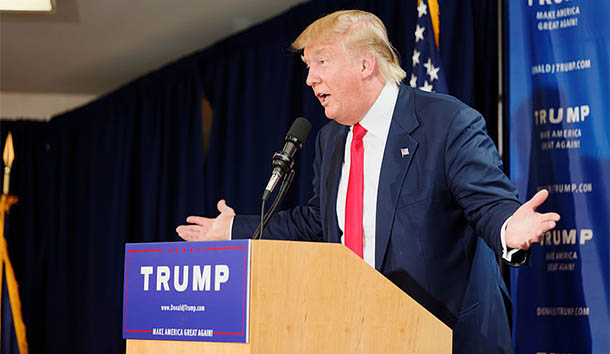Donald Trump reveals something to us about ourselves, if we are honest enough to face it: We care far too deeply about presidential politics and not enough about our actual problems.
Please, put down the pitchfork and listen for just a minute. Believe me, I understand.
Trump has raised the very important immigration issue, and his speeches have resonated with many frustrated citizens across the country. The Washington Post identifies them as the “uneducated.” Apparently, once you gain an education, you forget what it means to have a country. Borders, history tells the “educated,” are tools of oppression designed to keep out future Democratic voters who are employed by Republicans and work for less than minimum wage.
Trump’s standard speech places great emphasis on immigrant crime, and he can pile up newspaper articles that reveal horror stories involving Hispanic rapists and killers whom the federal apparatus cannot seem to find the strength to deport permanently. Trump is careful to preface his statements with “I love the Mexican people!” and “I employ thousands of Mexicans,” and the media responds by helpfully distilling his perspective (and that of the uneducated boobs who like his speeches) into the following absurd untruism: Trump thinks all illegal immigrants are rapists.
As Trump surges in the polls, the vast array of GOP candidates joins the chorus of pearl-clutchers in denouncing him. It shocked the nation, according to them, to learn that Donald Trump despises Sen. John McCain, and that the latter’s time in the Hanoi Hilton didn’t, in Trump’s estimation, give McCain a free pass to be an awful politician for decades on end, cultivating his own image as a media darling while doing next to nothing to stop the border crisis in his own home state.
In light of the very real threat Trump poses to their electoral success, the GOP field is insisting that he does not have the gravitas to be president. That has to be some kind of joke coming from a list of gaffe-mongering party tools that includes Rick Perry, who forgot where he was during the debates last time around, and Lindsey Graham, whose foreign policy objective is to destabilize as many countries as possible, transforming them into future bombing targets.
More deeply, the Trump-is-a-joke meme ignores the endemic buffoonery that is at the core of democratic politics. Chesterton wisely likened modern elections to a bunch of drunks trying to out-shout one another in a tavern. Of course, Chesterton liked taverns, and not just for the obvious reason. “I remember that a roomful of Socialists literally laughed when I told them that there were no two nobler words in all poetry than Public House,” G.K. wrote. “They thought it was a joke.”
The socialist tries to establish equality by force, but, as in the kindergarten classroom, that means one despot is in charge. In the tavern, however, you can find the only sort of spontaneous egalitarianism that exists in the real world; men dish it out only if, and insofar as, they are willing to take it.
Dr. Johnson, Chesterton wrote approvingly, “was not in the least a despot; Johnson was a demagogue, he shouted against a shouting crowd. The very fact that he wrangled with other people is proof that other people were allowed to wrangle with him. His very brutality was based on the idea of an equal scrimmage, like that of football.”
Like G.K.’s socialists, Americans today revere politics and the political process, and whenever the fur flies, they long for halcyon days that never existed, in which political discourse was the province of silk-gloved dudes. That is a sign of our utter feminization, if not emasculation. Ultimately, sniping at Trump over his rhetoric is not a plea for nobility but an admission of failure and weakness, a back-door power play disguised as civility.
The trouble with Trump is not his bloated ego but ours, because the horror we express at him is out of place. Americans want political speeches that bear the dignity of a Sunday sermon, and Sunday sermons that bear the dignity of a Vegas comedian’s act. We talk about politics and obsess about elections as if these regular bouts of silliness are the driving force behind civilization. But it takes a much greater effort to teach our children who we are as a people and why, as history and the Decalogue’s establishment of private property suggest, having a border and enforcing the law are normal and natural things for countries and governments. Telling the kids from down the street that they may not stay for dinner and must go home now is not somehow racist; it is a simple recognition that this house is ours and not yours. That we feel we must apologize for thinking such things is why we are in this mess to begin with.
Yes, Donald Trump is no Samuel Johnson, and Jeb Bush is no Joseph Addison. But insofar as the man who would be Bush III is very, very concerned about Trump’s “tone,” he bears some resemblance to Addison, who, Chesterton reminds us, “had exquisite manners and was the king of his company; he was polite to everybody; but superior to everybody; therefore he has been handed down forever in the immortal insult of Pope—‘Like Cato, give his little Senate laws / And sit attentive to his own applause.’”
[Image by Michael Vadon (Own work) [CC BY-SA 4.0 (http://creativecommons.org/licenses/by-sa/4.0)], via Wikimedia Commons]

Leave a Reply